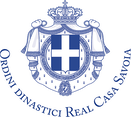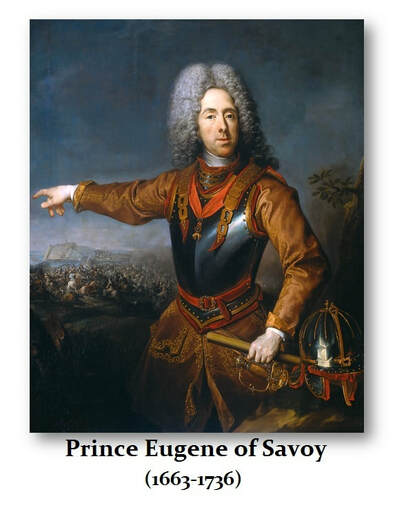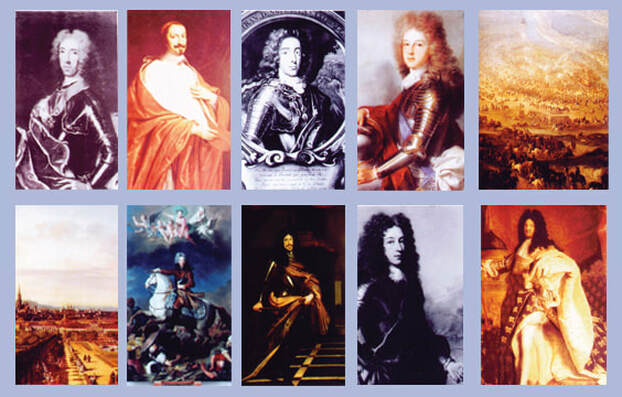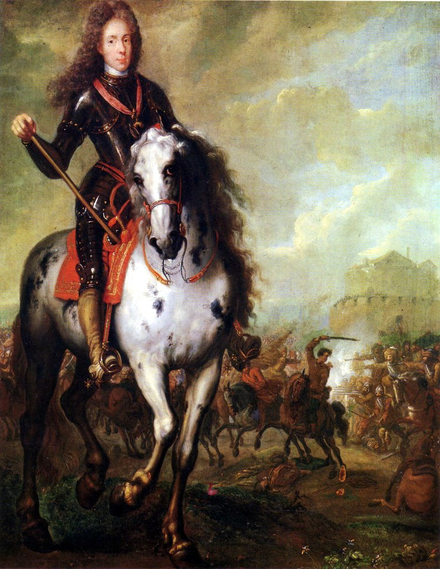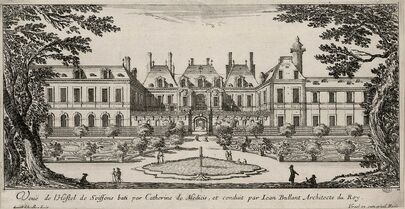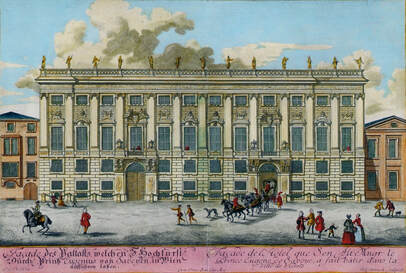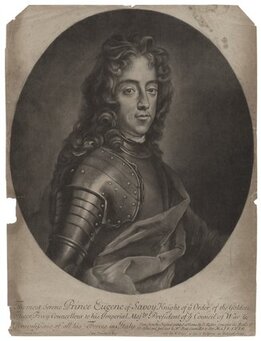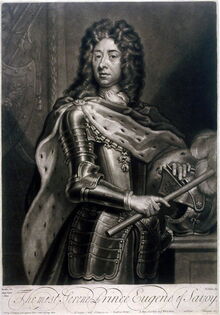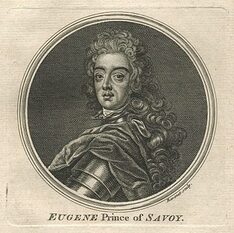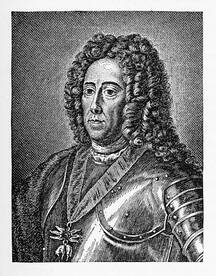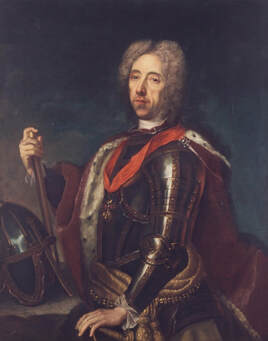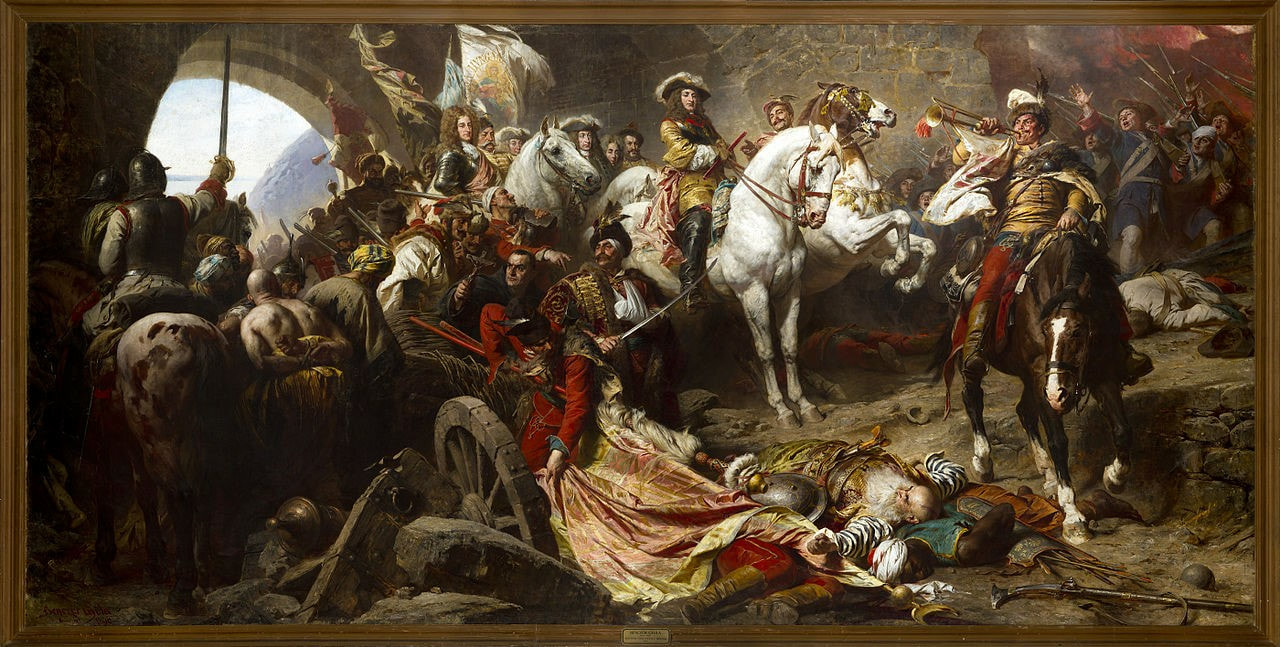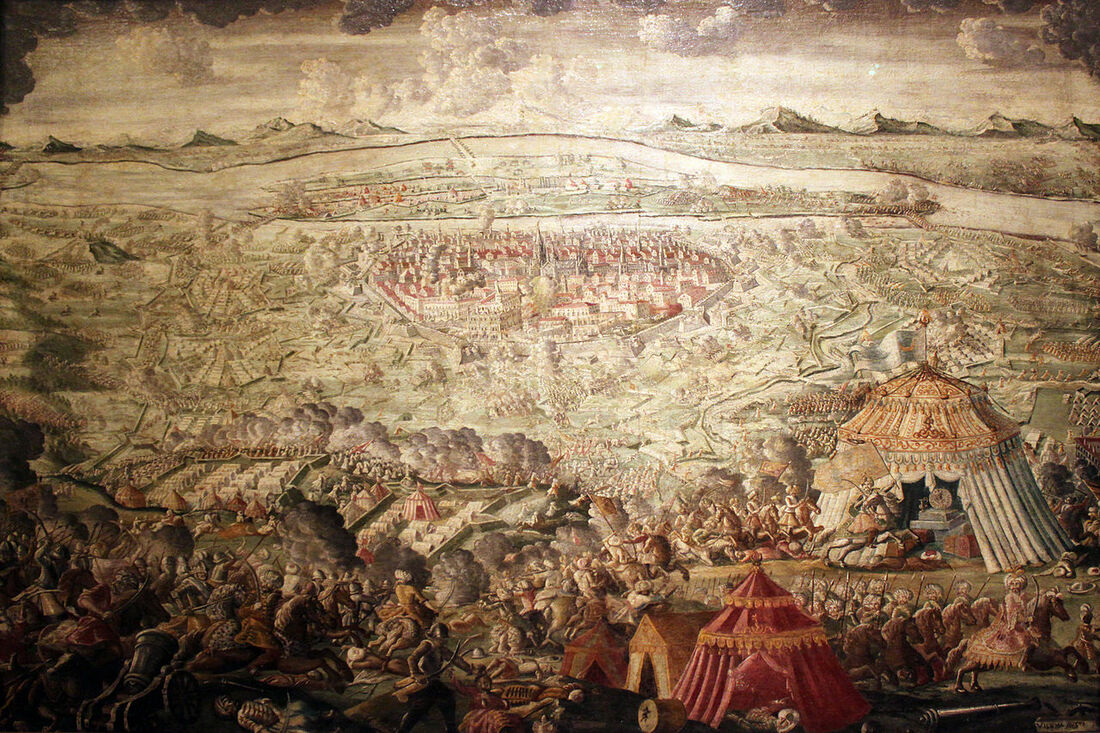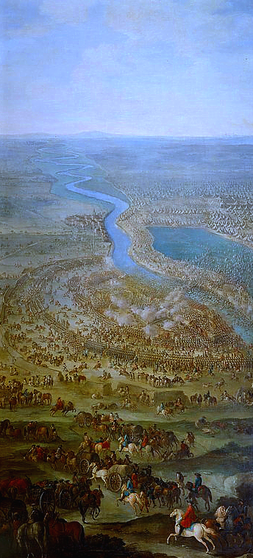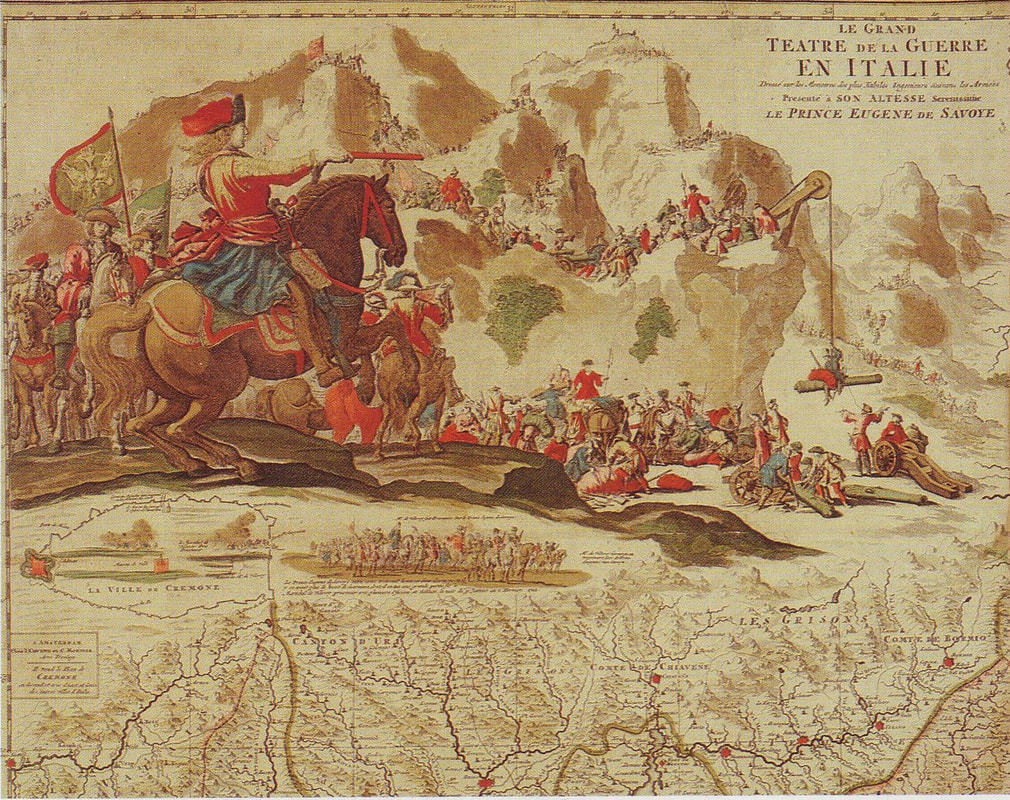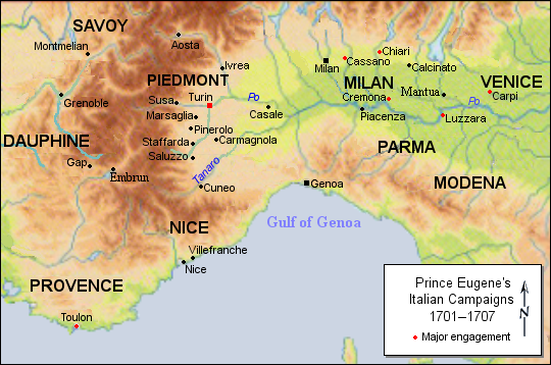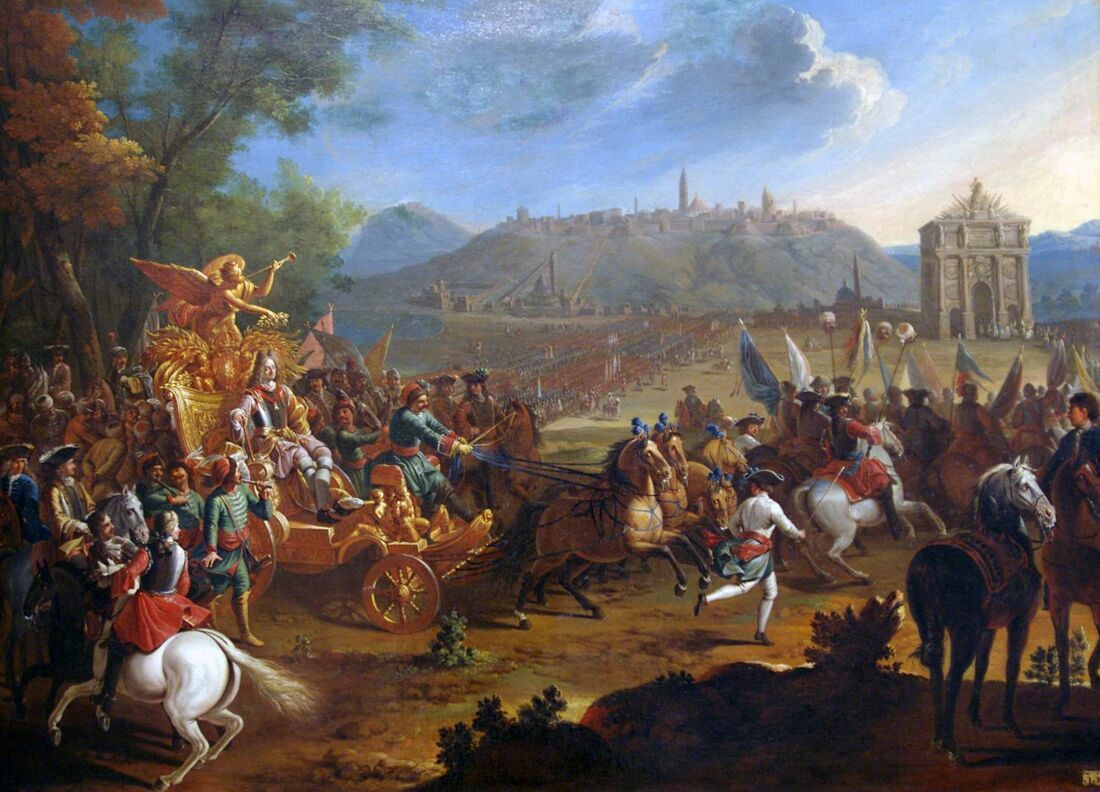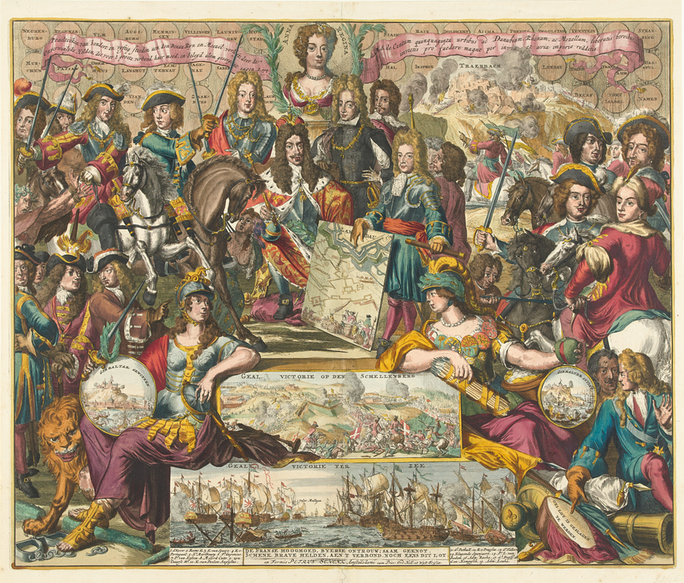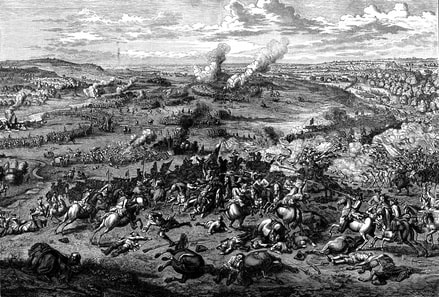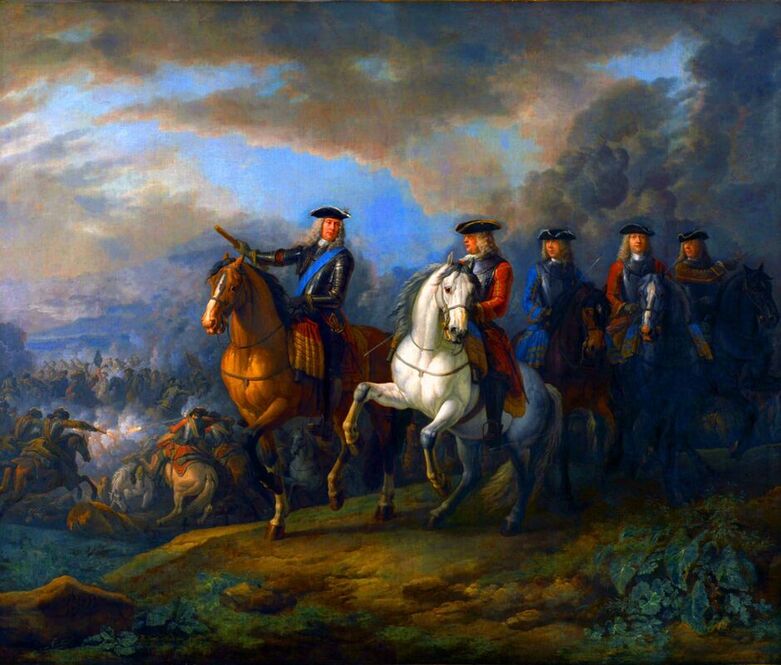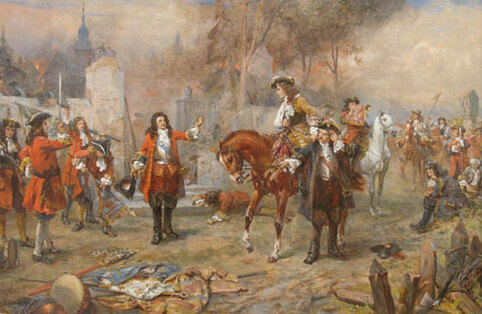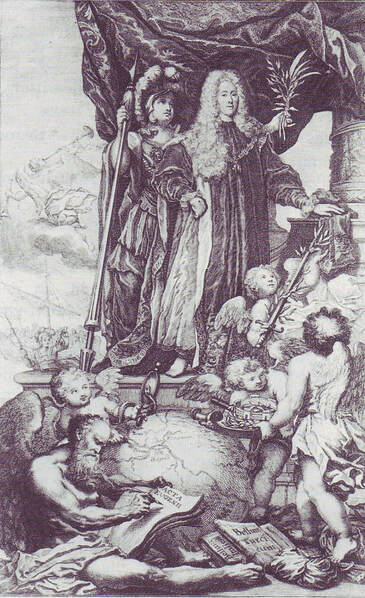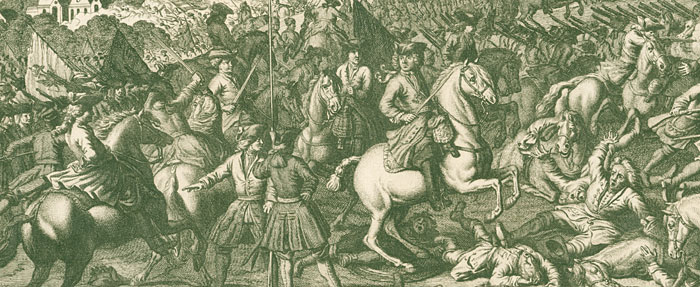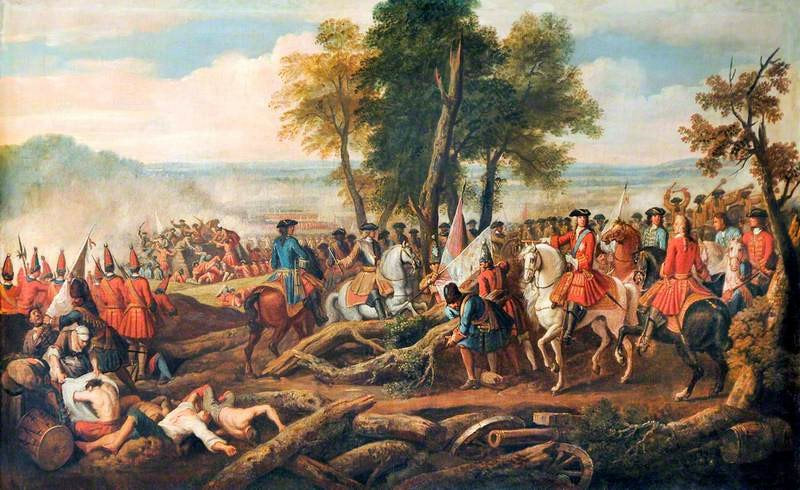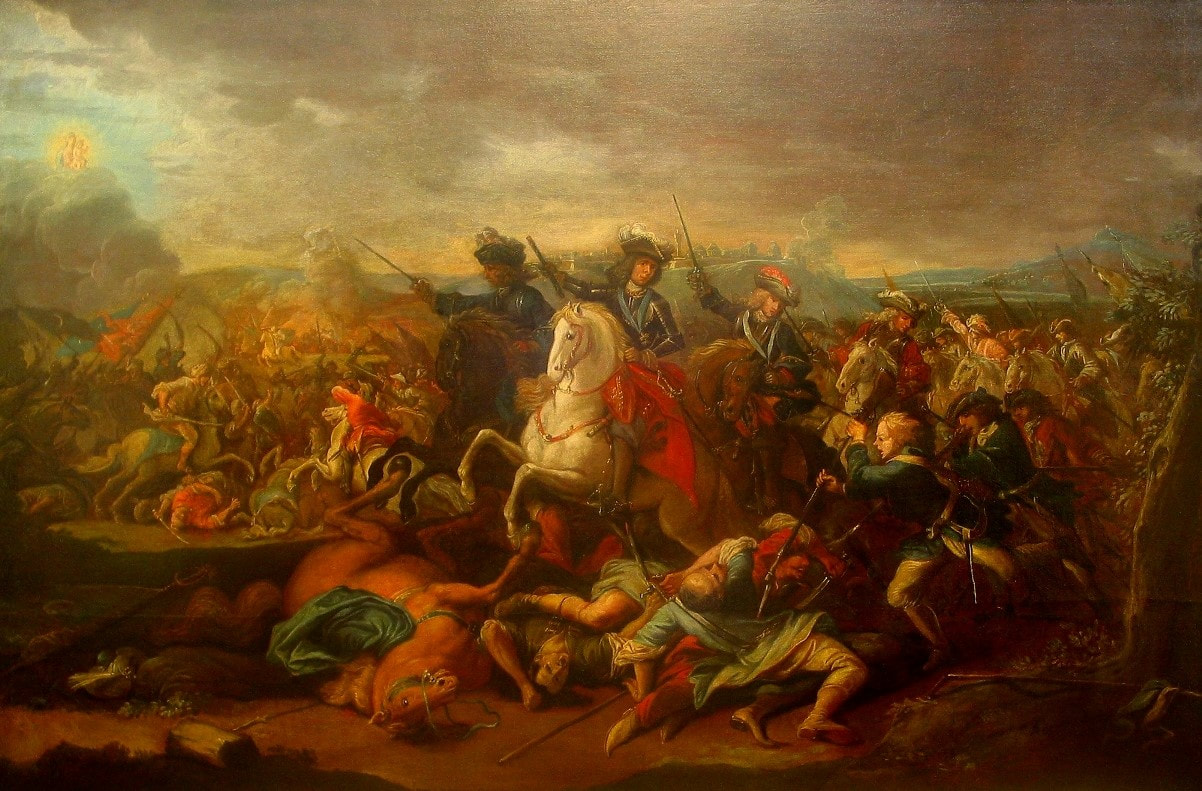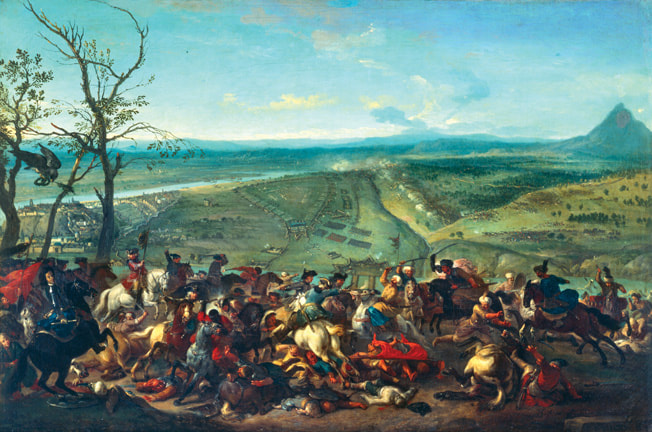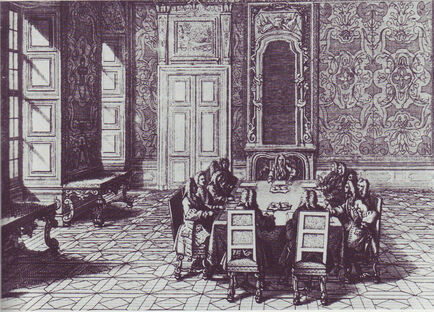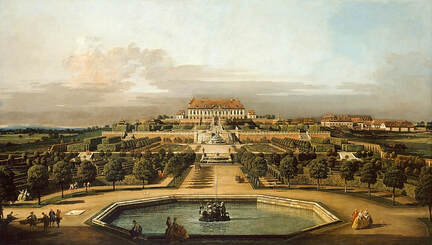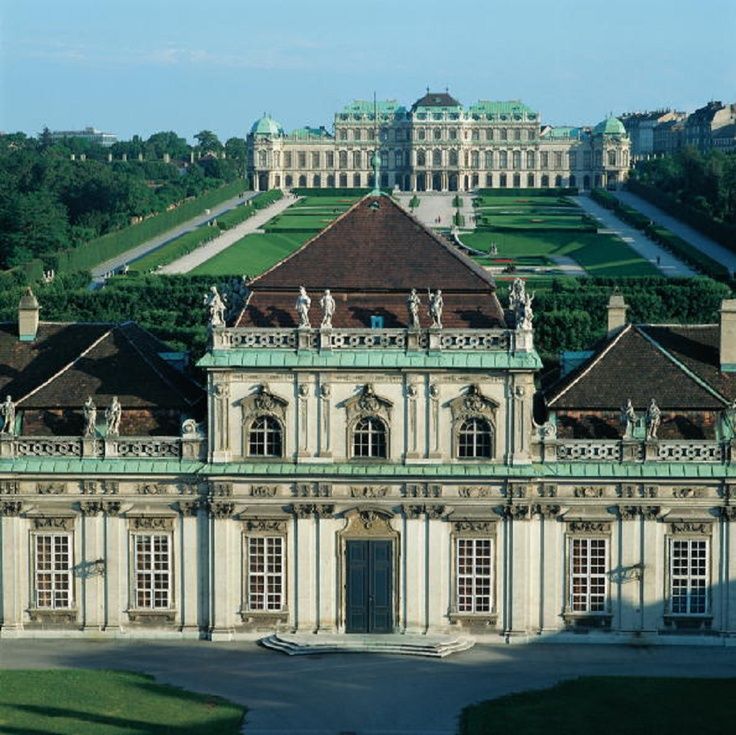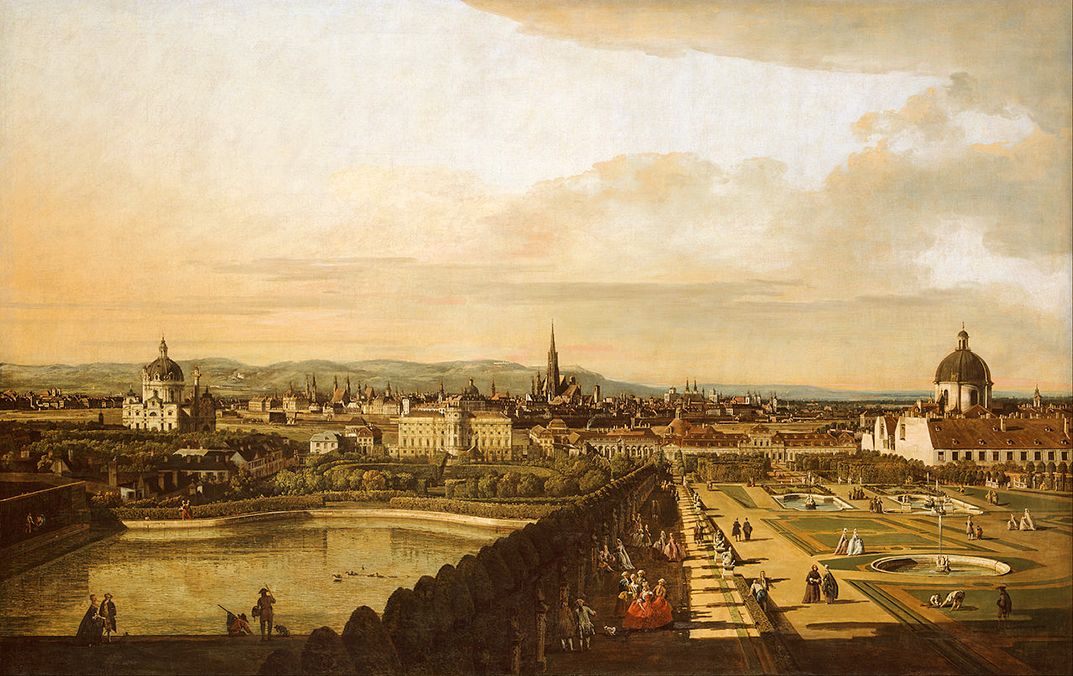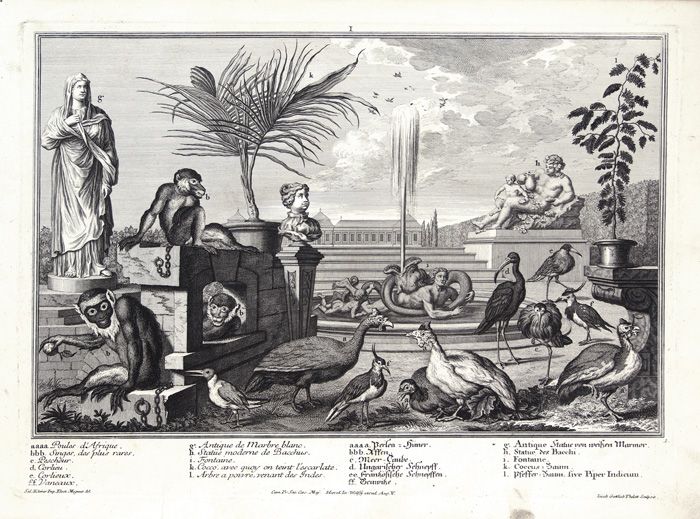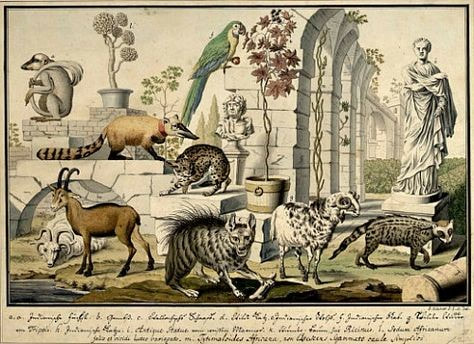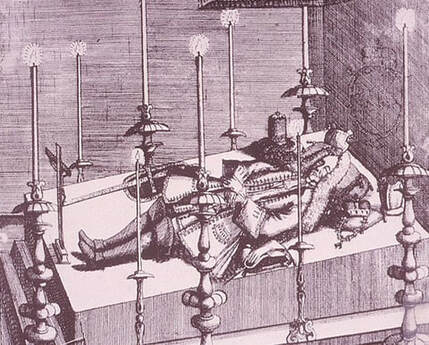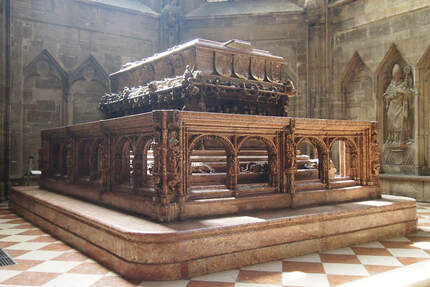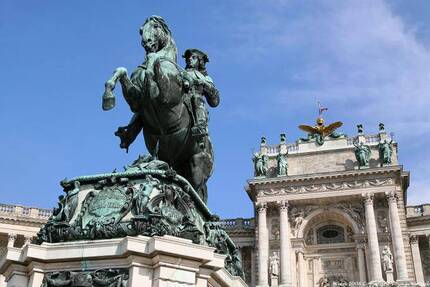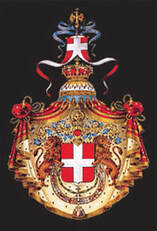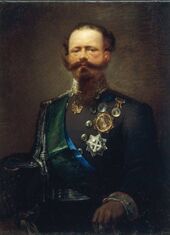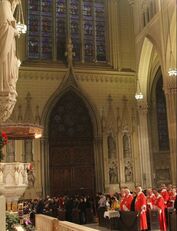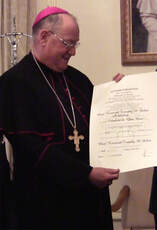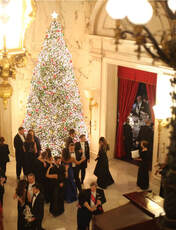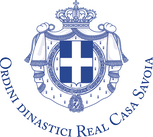American Delegation of Savoy Orders
The Swift Sword of Savoy
Prince Eugene of Savoy as General, Statesman, Connoisseur and Collector
American Delegation of Savoy Orders, New York City
INAUGURAL LECTURE
Delivered on November 5, 2003
History Lecture Series
Cav. Marco Grassi, Chair
INAUGURAL LECTURE
Delivered on November 5, 2003
History Lecture Series
Cav. Marco Grassi, Chair
|
In New York City's Knickerbocker Club, 5 November 2003, William B. Warren, a respected authority and collector of materials relating to Prince Eugene of Savoy (1663-1736), inaugurated the American Delegation of Savoy Orders' History Lecture Series on Wednesday, November 5 with a lecture on the celebrated 17th century military commander, statesman and bibliophile. The lecture was given at the Knickerbocker Club in New York City and was followed by a cocktail reception. (Full text below) Marco Grassi, a member of the Savoy Orders, served as chair for the lecture series. Also in attendance were Dr. Sergio Pellecchi, president of the Giunta of the Savoy Orders, who represented and read a letter from the Grand Master of the Savoy Orders, H.R.H. Prince Victor Emmanuel of Savoy. (The full text of the Prince's letter is reproduced below the lecture.) Also present were HRH Prince Michel of Yugoslavia, nephew of Prince Victor Emmanuel, and H.E. Archbishop Celestino Migliore, Permanent Observer of the Holy See to the United Nations. Carl J. Morelli, American Delegate, and James C. Risk, Delegate Emeritus, represented the American Delegation of Savoy Orders. Attendance totaled nearly 100. Mr. Warren's lecture, profusely illustrated with slides, surveyed Prince Eugene's considerable achievements both in war and in peace. Born in 1663 in Paris, the future imperial field marshal was of Savoyard, Spanish, Italian and French descent. His father, |
Eugene Maurice, was descended from the cadet branch of the ducal house of Savoy and the French royal house of Bourbon. His mother, Olympia Mancini, was the niece of Cardinal Mazarin, prime minister of France to the young King Louis XIV. Prince Eugene's family intended him for a career in the church although he longed for a military career. When Louis XIV turned down his application for a commission, the young Prince fled the French court and entered the service of Holy Roman Emperor Leopold I. His first mission in Austrian service was to help relieve Vienna, then under siege by the Turks. He distinguished himself sufficiently that he was offered the command of a regiment of Dragoons. From that beginning, Prince Eugene went on to a brilliant series of military victories culminating in his most celebrated triumph, jointly with John Churchill, Duke of Marlborough: the crushing defeat of allied French and Bavarian forces at the Battle of Blenheim in 1704. He died in 1736, aged 73, in Vienna and is buried in St. Stephen Cathedral, with members of the Habsburg dynasty. Prince Eugene was also an avid book collector and builder. Mr. Warren, a former president of the Grolier Club and a member of the Savoy Orders, noted that at the Prince's death, his library accounted over a tenth of the value of his total estate which also included four palaces. The Prince's handsomely bound collection of books and manuscripts was not just for show: one friend commented that he had read, or at least skimmed, nearly all the books in his library. The Prince's palaces were equally impressive, including his art collection, gardens and private menagerie of exotic birds and beasts. |
THE SWIFT SWORD OF SAVOY
Prince Eugene of Savoy as General, Statesman, Connoisseur and Collector
By
Cav. Avv. William B. Warren
|
It is the greatest of honors to have been chosen to inaugurate the American Delegation's History Lecture Series with a talk dedicated to Prince Eugene of Savoy. But first, I must express my hearty thanks to Marco Grassi for conceiving and planning this Lecture Series and preparing so many of the slides for my lecture, to Carl Morelli for organizing this evening at the Knickerbocker Club so well, and to my wife, Arete, for organizing the order, timing and projection of the slides.
Eugene was surely the greatest military genius the House of Savoy has produced, but there is no dearth of great soldiers on the family tree. Eugene's grandfather, Thomas of Carignano, was redoubtable Savoy warrior for France and Spain and the founder of the present royal line. Eugene's great great grandfather, Duke Emmanuel Philibert, won a crushing victory over the French at St. Quentin in 1557 as a commander of the Spanish army and definitely dashed French ambitions for European military supremacy for over a century. Although Eugene's reputation as commander and statesman was once widespread, I expect that nowadays name recognition in America only registers with those who have visited Vienna where his equestrian statue guards the main entrance of the Royal Palace and his magnificent Belvedere Palace complex is a must for every visitor to the city. So, because his name may be obscure to some, let me begin with a thumbnail sketch. Eugene lived from 1663 to 1736. He served three Austrian Habsburg Roman Emperors, Kaisers, in succession from 1683 when he was twenty until his death at age 73. He was responsible for major victories against the Turks who had pushed to the gates of Vienna in 1683. In conjunction with John Churchill, Duke of Marlborough, Winston Churchill's direct ancestor, he triumphed over the French under Louis XIV, who were trying to dominate all Europe. Although he is an Austrian national hero, I can find no trace of Austrian blood in his lineage, he being Italian by parentage with a royal French grandmother and a royal Spanish great grandmother. He was slight of build but tough, fearless and bristling with energy. He was a great builder as you can see from the Belvedere and a major collector of books and art. He never married and left no issue. |
|
Eugene was born not in Savoy but in Paris at the Palais de Soissons. His father, Eugene Morris, was Prince of Savoy Carignano but also Count of Soissons, a title he took through his mother, Eugene's French grandmother, Marie de Bourbon-Soissons, whose father, Charles de Bourbon, had been a cousin of Henry IV, the first Bourbon King of France. The Soissons Palace was in the Les Halles district of Paris and no longer stands, except for the tower, once used as an astronomical observatory. The last time I looked, about 10 years ago, the tower was still standing. As to the Savoy Carignano line of Eugene Morris, it was a junior to the ducal and royal line until 1831 when King Charles Felix died without issue and the Carignano branch succeeded from Prince Eugene's Carignano uncle, his father's elder brother, Emmanuel Philibert, a wise and highly respected statesman and pater familias, notwithstanding his being totally deaf and dumb.
Now Eugene's mother - Olympia Mancini - no royal blood here. She was very much a commoner, daughter of a Roman petit bourgeois but, as niece of France's all powerful Cardinal Mazarin, himself a commoner of Sicilian descent, Olympia needed no blue blood to secure the title of Princess and Countess. Among her sisters and brothers also imported to Paris from Rome by Mazarin, three of her sisters married Dukes to become Duchesses, while a brother was promoted to Duke of Nevers. And speaking of marriage, Mazarin's relationship with Anne of Austria, the widowed French Queen Regent, whom he served as principal minister, is said to have been so close the he secretly married her. She was then, of course, Regent for her infant son, Louis XIV. |
|
The young Eugene grew up at the French Royal court first under his mother's tutelage, but when she was banished from France for alleged participation in poison plots against her former lover, the King, Eugene's grandmother of Soissons assumed watch over him. Eugene was destined for a career in the Church but passionately longed for a military career. When this career was refused him because his slight build made martial success unlikely, he departed Paris without notice to King or family in order to join Kaiser Leopold I at Passau on the Danube 200 miles or so upstream from Vienna. The Kaiser, his court and armies were assembled at Passau because a rejuvenated Turkish Empire had swept over Hungary and Eastern Austria to Vienna which was under siege. His resentment against Louis, both for his contemptuous refusal to grant him military service and the banishment of his mother led him to swear never to return to France except with drawn sword in hand, a promise he kept to Louis' immense detriment. Eugene's baptism of fire was before Vienna where an international army led by King John Sobieski of Poland and Duke Charles of Lorraine raised the siege. For his valor before Vienna, Charles of Lorraine awarded Eugene a pair of golden spurs and the promise of the first Dragoon regiment to become available. Thereafter, Eugene's military career skyrocketed upward. After serving with the armies pushing back the Turks across Hungary and beyond Belgrade he was posted to Savoy in 1691 to lead the Austrian contingent in a war with France that had broken out over the passes. In 1693, at age thirty, he was promoted to Field Marshal, Austria's highest rank. However, his military tasks in Savoy did not keep him from joining the rest of European high society in celebrating several carnivals in Venice with his good chum, but later bitter enemy at arms, Max Emmanuel, Elector of Bavaria. While Eugene came up with some limited success in Savoy, Duke Victor Emmanuel lost patience with Vienna's chronic failure to supply Eugene with men and material and transferred his allegiance to France. This forced Eugene to retire to the Spanish held Milan in 1696. Thereupon, Eugene was transferred to the Turkish front where, at Zenta, in present-day Serbia, he won his first great victory in September 1697. Having learned that the Turkish forces were in the process of crossing the Tisza river, a tributary of the Danube east of Belgrade, a series of forced marches enabled him to catch the Turks utterly off guard in the awkward position of their cavalry and artillery having crossed to the other side while their infantry was filing up in line to cross on the limited number of bridges. The surprise was so complete that an estimated 20,000 Turks were cut down, 10,000 drowned, and the Grand Vizier himself cut down by his own men in the struggle to get across. Eugene lost 300 men. This victory was so conclusive as to bring the Turkish war to an end shortly thereafter with the Peace of Karlowitz which gave Habsburg all of Hungary and much of Serbia and Transylvania. Austria's ally, Venice, was awarded large portions of Dalmatia and Greece. This victory at Zenta exemplified Eugene's immense talent for lightning-like maneuvers and surprise. |
|
An important supporter of Austria at the siege of Vienna and in the subsequent Turkish wars was the tireless Capuchin preacher and miracle worker, Marco of Aviano, who was beatified in Rome this year. In addition to acting as the Kaiser's confessor and counselor, he accompanied the troops into the thick of battle, preaching the crusade against the infidel Turks. His eloquence raised the fighting spirit of the troops to a fever pitch, a feat which proves his effectiveness as a miracle worker since he preached in Italian, a language that few of those German-Austrian farm-bred troopers could comprehend.
His reputation greatly enhanced by his victory at Zenta, Eugene enjoyed two years of peace at the close of the 1600's. During that time, he purchased the ground and began building his city palace int he Himmelpfortgasse, a very short walk from St. Stephen's Cathedral in the center of Vienna. He also purchased and began the gardens for what would become the Belvedere Palace just outside the then city walls. While the booty from the Zenta fight aided in financing his building, his real financial support in those years came from the income off two abbeys in Savoy, granted him out of familial affection by his cousin, Duke Victor Amadeus. To qualify for this income, he took minor religious orders which precluded marriage and it has been suggested that he never married in order to preserve his Abbot's income. |
In alliance with France was Bavaria under Eugene's old chum from the Turkish wars and the Venice carnival, Max Emmanuel, who had been promised by Louis the governorship and perhaps the crown of Belgium. Savoy was also initially allied to France because Victor Amadeus's daughter was married to the French claimant to Spain, Philip of Anjou. Particularly threatening from Austria's standpoint was French support for a major Hungarian uprising under Francis Rakoczi II. The eastern threat took years to suppress and tied down the bulk of Austria's army throughout the succession war, thus limiting the number of Austrian forces in the West although, thanks to Eugene, these small numbers played a major role.
Just as many generations of Austrians in what would become the Austro-Hungarian army would march to the tune of the Prinz Eugene March, their Hungarian colleagues would march to the Rakoczi March, both musical memorials to the Spanish Succession conflict.
Eugene began the war in 1701 in Italy. After crossing the Alps in South Tyrol over a route never before traversed by an army and hitherto thought impossible, he headed west for French occupied Milan and decisively defeated the French at Chiari, east of the city. This victory convinced the English and Dutch allies that the time had come to put their forces into action which, in turn, induced Duke Victor Emmanuel of Savoy to abandon his French ties which had become oppressive to him as a result of Louis' arrogant treatment of the Duke as a mere puppet. Prince Eugene's personal ties to Victor Emmanuel played a major role in this shift. A mounting crisis north of the Alps would lead Eugene out of the Italian theatre where he had not taken Milan but had more or less stabilized the situation in Austria's favor. But, before leaving Italy, he pulled off a stunt that caught the headlines throughout Europe. In early 1702, the French headquarter was wintering in Cremona. A priest, who was a good friend of one of Eugene's commanders, tipped off the Austrians that a dried up river bed under the city walls led into his own cellar. Taking advantage of this route, Eugene's troops were able to surprise and capture the French high command in their nightshirts, including the commander-in-chief, Marechal Villeroi.
What commanded Eugene's attention in the north was a vicious pincer movement on Vienna from east and west. In the West, Max Emmanuel of Bavaria with major French forces has occupied Tyrol and was moving down the Danube to Vienna. In the East, Rakoczi was threatening the city as well.
Just as many generations of Austrians in what would become the Austro-Hungarian army would march to the tune of the Prinz Eugene March, their Hungarian colleagues would march to the Rakoczi March, both musical memorials to the Spanish Succession conflict.
Eugene began the war in 1701 in Italy. After crossing the Alps in South Tyrol over a route never before traversed by an army and hitherto thought impossible, he headed west for French occupied Milan and decisively defeated the French at Chiari, east of the city. This victory convinced the English and Dutch allies that the time had come to put their forces into action which, in turn, induced Duke Victor Emmanuel of Savoy to abandon his French ties which had become oppressive to him as a result of Louis' arrogant treatment of the Duke as a mere puppet. Prince Eugene's personal ties to Victor Emmanuel played a major role in this shift. A mounting crisis north of the Alps would lead Eugene out of the Italian theatre where he had not taken Milan but had more or less stabilized the situation in Austria's favor. But, before leaving Italy, he pulled off a stunt that caught the headlines throughout Europe. In early 1702, the French headquarter was wintering in Cremona. A priest, who was a good friend of one of Eugene's commanders, tipped off the Austrians that a dried up river bed under the city walls led into his own cellar. Taking advantage of this route, Eugene's troops were able to surprise and capture the French high command in their nightshirts, including the commander-in-chief, Marechal Villeroi.
What commanded Eugene's attention in the north was a vicious pincer movement on Vienna from east and west. In the West, Max Emmanuel of Bavaria with major French forces has occupied Tyrol and was moving down the Danube to Vienna. In the East, Rakoczi was threatening the city as well.
|
The Marlborough/Eugene partnership bore spectacular fruit in the Blenheim campaign of 1704. Pursuant to an agreed upon plan, Marlborough's "scarlet caterpillar" marched down the Rhine and into southern Germany where Eugene had managed to come west, outmaneuvering the opposing Franco-Bavarians to join Marlborough near the Rhine. Marlborough and Eugene after these marches met for the first time at an inn known as The Lamb, in the village of Gross Heppach south of Heidelberg. I have enjoyed magnificent local red wine at The Lamb with a splendid blood pudding under a mural celebrating the historic meeting of the two great chieftains and recommend that you likewise dine at The Lamb if you should be in Heidelberg, Stuttgart neighborhood. The combined British, Dutch, German and Austrians under Marlborough and Eugene surprised the Franco-Bavarians at Blenheim on the Danube in Bavaria on August 13, 1704. Marlborough pierced the French defenses and then annihilated their forces at Blenheim on the river bank while Eugene tied down major portions of the French and Bavarians to Marlborough's north. Eugene was faced by, among others, the most redoubtable of the enemy, the "Wild Geese," the Irish Catholic exile units serving under Louis and soldiers whose valor cannot be too highly praised. Even though being outnumbered and needing every man of his command, Eugene acceded to Marlborough's request to him for reinforcements when the English attack appeared to be faltering. Eugene's unselfish generosity saved the day. I will leave details of the battle, for those of you who wish to follow up on them, to Winston Churchill who describes the battle with his usual eloquence at length in his monumental biography of his ancestor Marlborough. As to Eugene's qualities, Winston Churchill writes: |
|
"At this moment we can perceive and admire the comprehensive and flexible quality of Eugene: commander of an all important local operation [Blenheim],...and the supreme commander of the military efforts of a vast disintegrating Empire. He discharged all these variously graded functions with perfect harmony. Like Marlborough, he could conduct a local action and ride in person with the charge without losing in the slightest degree his general sense of values. Like him, he could mix, sword in hand, in a melee and, if not injured, emerge with judgment undistorted."
While the military qualities and contributions of Marlborough and Eugene were on a par, their royal masters' recognition was hardly comparable. John Churchill received the title of Duke of Marlborough and the gift of Blenheim Palace which was built at the expense of the nation. Habsburg thanks did not include any new titles and was limited to 6,000 guilders, approximately 750 Pounds Sterling, paid by the Kaiser to the City of Vienna in return for a kind of tax exemption for Eugene's winter palace which Eugene had built and paid for himself. But the House of Habsburg has ever been notorious for its parsimony when it came to material rewards for services rendered--instead, "noblesse oblige" has been its response. On the point of generosity, the roles were reversed when it came to Marlborough and Eugene. The Duke was a notorious skinflint, so much so as to be the butt of innumerable jokes and cartoons in the British press. So it was, as Thackery relates in his great historical novel, Henry Esmond," that the British staff officers, including Esmond, vied for invitations to mess at Eugene's tent, where they would be assured of fine Savoyard food and wine as opposed to fish and chips with Marlborough. Blenheim secured Germany and Austria from French domination. This left Italy and the Low Countries to be dealt with. In 1706 Eugene's great victory at Turin ended the French threat to Savoy and that city to this day recalls this fight with ample memorials. On 16 April 1707, Eugene entered Milan in state, riding a splendid armored war horse and then changed to a six-horse carriage to process to the Cathedral for a Te Deum. The streets were carpeted with flowers, wine flowed from the fountains. Austria's 150-year rule in Lombardy thus began with enthusiasm, an enthusiasm that we know did not last as demonstrated by the 1848 revolution and the 1859 war of unification against Austria, culminating in the Austrian defeat at Solferino. |
|
In 1707 Eugene dispatched 10,000 men to take Naples from the Spaniards which was easily done with the help of the Anglo-Dutch fleet that cut off all possibility of reinforcements from Spain. In the peace settlement in 1713, Victor Emmanuel of Savoy was given the throne of Sicily (not Naples which went to Charles VI of Habsburg) but exchanged it in 1720 for Sardinia. Naples passed first to the Habsburgs and then, together with Sicily, by conquest, to the Bourbons in 1734, with whom it remained until the House of Savoy assumed the Crown of a unified Italy in 1861. Eugene then joined Marlborough for campaigning in the Low Countries from which the French were ejected after the great victory Eugene and Marlborough won at Oudenarde in 1708. This opened up France for invasion and Eugene might well have marched into Paris sword in hand, had not war weariness led to a change in administration in London and Britain's withdrawal from the war, leaving Eugene alone to fare as best he could against France. A prolonged mission to London in 1712 by Eugene failed to mend the alliance although Eugene was given a hero's welcome and attracted a crowd wherever he went. Jonathan Swift, author of Gulliver's Travels, first wrote of Eugene that he was not, as rumored, an "ugly faced fellow" but "well enough and a good shape." Subsequently, anti-war feeling go the better of Swift who then declared the Prince to be "very plain...plaguey yellow, and tolerable ugly besides." The end of the war found Eugene campaigning in Flanders and in the winter of 1714 he negotiated the final peace. Belgium changes its name from the Spanish to the Austrian Netherlands which it remained until the French Revolution. Austria also replaced Spain as the dominant power in Lombardy and Southern Italy. France, which had suffered immense financial losses due to the war, was returned to its pre-war boundaries, but the Bourbon Philip of Anjou kept the much weakened Crown of Spain as Philip V. And, thanks to Eugene's talents as general and diplomat, Austria, replacing Spain, attained great power status with England and France as a key nation to the European balance of power. |
|
I know you will have heard enough of war and diplomacy but since Eugene's subsequent triumphs against the Turks were as memorable as his prior victories, I must give them another minute.
In 1716 Austria and Venice went to war with Turkey and at Peterwardein in present day Serbia, Eugene defeated an army twice his army's size. This earned him from the Pope a consecrated had and sword which was the customary Papal award for victories over the infidel. Dare I hope that such a hat and sword be awarded by His Holiness to Eugene's successor victor over the infidels, Secretary Rumsfeld, for his victory at Baghdad over the infidel Saddam? Surely, the now beatified preacher of crusade against the infidel, Marco of Aviano, would enthusiastically favor such an award. In the following year 1717, the Turks almost turned the tide and their army of 230,000 surrounded by Eugene's 100,000 men who were besieging Belgrade. News spread through Europe that Eugene had met his match at last and that the game was up. But in a brilliant surprise counterattack, in which Eugene had been careful to well-fortify his troops with wine, brandy and beer, the Turks were again annihilated and Belgrade was won for Christendom (let's pray that Mr. Rumsfeld can pull off a similar coup). At Belgrade, Eugene received his 13th battlefield wound showing that his reputation for personal valor had been painfully won. Belgrade was also the subject of the famous German folk song, "Prinz Eugene der Edele Ritter," "Prince Eugene the Noble Knight," which was well known to every German school child while school children still learned folk songs. On a more somber note, the song became the Prince Eugene March I mentioned earlier to which Hitler's troops entered Vienna in March 1938. With the Turkish threat now eliminated like the French one, Eugene retired to 20 years as a principal minister at the Courts of Emperor Leopold's sons, the Emperors Joseph I and Charles VI. Just prior to his death at age 73, he commanded in the war of the Polish succession of 1733-1735, a languid war of slow maneuvers reflecting the age of itc commander. Posted to Eugene as a adjutant volunteer in that war was the Crown Prince of Prussia, subsequently Frederick the Great. Frederick, age 20, reported of the aged Eugene that "his body was still there but his soul had gone." But soul or no soul Eugene warned Vienna that "much is at stake in gaining this young prince who will be able to do as much harm as good." As with many of Eugene's admonitions to his successors, the advice was not followed and Frederick did in fact become "great" by doing immense harm to Austria in the wars against Maria Theresa of the 1740's, 50's and 60's. |
|
Before concluding with some remarks on Eugene as a builder and collector, I thought I should briefly touch on his private life. While we know he greatly enjoyed the company of the ladies, he was in truth, a Mars without Venus. He did indeed maintain a 20-year close friendship with the widowed Countess Eleonora Bathyany, with whom he had played at cards on the night he died. But I find no evidence of an erotic attachment to her or any other lady or, for that matter, any gent. A French biographical novel on Eugene came out last year suggesting an inclination towards the gents. It is true that as a boy at the French Court he was said to be part of a circle about the Abbe de Choisy who is reported to have invariably dressed as a girl, except when he wore the lavish costumes and makeup of a mature woman. In any event, there is no suggestion of any kind of gay relationship after he left Paris, and we can be certain that if there had been any scandalous relations with men or women, the very effective French intelligence services would have reported it in detail.
As far as language is concerned, Eugene was, of course, fluent in French and Italian. His German was limited, and we know of no writings in that language. As to nationality, he did once say: "I have three hearts, a passionate Italian heart with which to confront my enemies, and obedient French heart for my monarch and a loyal German heart for my friends." Interesting his view of the French as obedient. This testifies to the power of Louis XIV to command their allegiance but I wonder what Louis XVI, and his Queen, Marie Antoinette, would have thought of French obedience as they mounted the guillotine. |
|
|
Now the collections: It is said that Eugene's passion for book collecting began on his London mission in 1712. An English negotiating ploy during his stay in London was to cancel or postpone appointments and during the interminable waits he had ample time to visit London's antiquarian book dealers in the company of his faithful aide de camp. the Prussian in Austrian service, George William Hohendorf, himself an accomplished bibliophile with a collection of almost 7,000 books. Starting in London, Eugene began a collection of 15,000 printed works and 287 medieval manuscripts. By 1716 his friend, the French poet, Jean Baptiste Rousseau (not jean Jacques Rousseau of noble savage) reported: "The Prince's library is very extensive and consists of exceptionally fine books, beautifully bound. But what is most remarkable is that there is scarcely a book in which the Prince has not read or at least perused. It is difficult to believe that a many who almost alone carries such a public burden for all Europe, who is Field Marshal and the Emperor's Prime Minister, can find time to read almost as much as someone who has nothing else to do." Eugene had imported a leading binder from Paris who was at Vienna until Eugene's death - all his bindings bore his shield. As to bindings, Lady Mary Wortley Montague reported of her visit to the Prince and his library, that an attendant had jested that the several volumes on the art of war were bound with the skins of fallen Turks, a remark, she said, which raised "a smile of pleasure on the grave countenance of the famous warrior." The library, indeed Eugene's entire estate, was inherited by the Prince's heir, Victoria of Savoy Carignano, a child of a deceased brother. Eugene had never met her and did not want to because of the bad reputation she had acquired flitting from convent to convent in Savoy and France. Victoria sold the books en bloc to the Emperor Charles and these formed the basis for the Imperian, now National, Library in Vienna. Interestingly, for the estate inventory the Prince's library was valued at 150,000 Gulden, (then 20,000 Pounds Sterling), whereas the Belvedere was valued at only 100,000 which says something for the then current real estate values. As to his art collection, valued like the Belvedere at 100,000 Gulden, it was acquired at his death in large measure by the House of Savoy and can now be seen in Turin. One English art historian has described Eugene as the most influential private patron in Europe, and he was an avid frequenter of the galleries; one print which I have seen shows him on his knees to examine a stack of paintings at an Amsterdam dealer's. The art collection is less spectacular to my mind than the library, being mostly 16th and 17th Century Dutch and Flemish paintings, and also works by minor followers of Titian, Raphael and Caravaggio. |
|
Finally, and perhaps his most lasting memorial, the buildings. As I mentioned, his first Vienna Palace was his town house in the Himmelpfortgasse. It is so sandwiched among other houses today in the narrow medieval streets that one might pass it by without notice were it not pointed out. It was designed by Fischer von Erlach, the architect of the Imperian summer palace, Schoenbrunn, and now serves as the Finance Ministry. All that remains form Eugene's time is the grand staircase.
Twenty miles or so outside of town is his hunting lodge, Schlosshof, built in the 1720's by Lucas Hildebrandt, also the architect of the Belvedere. It was here that Eugen spent many autumn shooting seasons, the Countess Bathyany acting as his hostess. The Schlosshof is show here in painting by Bernardo Belotto. The pièce de résistance is the Belvedere, also designed by Hildebrandt, who has served under Eugene as a siege engineer. I am fortunate to own a volume of about 100 engravings of the Belvedere dating from Eugene's lifetime and from them you can get a feel of the Austrian baroque elegance. The Lower Belvedere served as his summer residence and the Upper was used only for ceremonials. Today, the Upper Belvedere is the Museum of Modern Austrian Art, where you will see many Gustav Klimts which I expect would have appealed to Eugene. There are also many Ego Schieles of which I expect he would not have approved, anymore than I do. Eugene died in Vienna on the night of April 20-21, 1736, at age 73, quietly in his sleep after an evening of cards, probably his favorite game, Piquet, a kinf of Whist I'm told, with his old friend, the Countess Balthyany. The story, probably apocraphal, has it that the Prince's pet lion died the same night in Eugene's menagerie in the Belvedere garden. Eugene lay in state for three days. Before his funeral his heart was cut out and sent to Turin for burial with others of the House of Savoy. His funeral cortege to the Cathedral lasted two hours. The Kaiser and others of the court accompanied the procession, but etiquette required that they go incognito since Eugene was not an Habsburg. His tomb is to be seen in a chapel of the Cathedral, just to the left of the main entrance. |
|
I first heard mention of Eugene as a child in the late nineteen thirties in a poem read aloud to me called "After Blenheim" written by Robert Southey at the end of the 18th Century. It tells of old Kasper, a farmer near Blenheim, whole little grandchildren, Peterkin and Wilhelmine, had found a dead soldier's skull in the field and had asked old Kasper what it was doing there.
The poem: After Blenheim It was a summer evening, Old Kaspar's work was done, And he before his cottage door Was sitting in the sun; And by him sported on the green His little grandchild Wilhelmine. She saw her brother Peterkin Roll something large and round Which he beside the rivulet In playing there had found; He came to ask what he had found That was so large and smooth and round. Old Kaspar took it from the boy Who stood expectant by; And then the old man shook his head, And with a natural sigh "Tis some poor fellow's skull," said he, "Who fell in the great victory." "I find them in the garden, For there's many here about; And often when I go to plough The ploughshare turns them out. For many thousand men," said he, "Were slain in that grat victory." "Now tell us what 'twas all about," Young Peterkin he cries; And little Wilhelmine looks up With wonder-waiting eyes; "Now tells us all about the war, And what they fought each other for." "It was the English," Kaspar cried, "Who put the French to rout; But what they fought each other for I could not well make out. But everybody said," quoth he, "That 'twas a famous victory." "My father lived in Blenheim then, Yon little stream hard by; They burnt his dwelling to the ground, And he was forced to fly: So with his wife and child he fled, Nor had he where to rest his head. "With fire and sword the country round Was wasted far and wide, And many a childing mother then And new-born baby died: But things like that, you know, must be At every famous victory. "They say it was a shocking sight After the field was won; For many thousand bodies here Lay rotting in the sun: But things like that, you know, must be After a famous victory. "Great praise the Duke of Marlboro' won And our good Prince Eugene;" "Why,'twas a very wicked thing!" Said little Wilhelmine; "Nay..nay..my little girl," quoth he, "It was a famous victory." "And everybody praised the Duke Who this great fight did win." "But what good cam of it at last?" Quoth little Peterkin: - "Why, that I cannot tell," said he, "But 'twas a famous victory." THE END |
|
Royal House |
History |
Orders |
Members |
News & Events |
